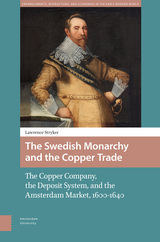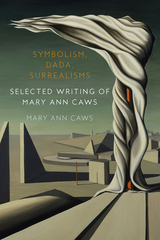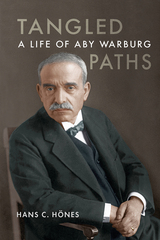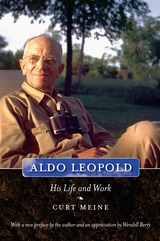
This biography of Aldo Leopold follows him from his childhood as a precocious naturalist to his profoundly influential role in the development of conservation and modern environmentalism in the United States. This edition includes a new preface by author Curt Meine and an appreciation by acclaimed Kentucky writer and farmer Wendell Berry.

This biography of Aldo Leopold follows him from his childhood as a precocious naturalist to his profoundly influential role in the development of conservation and modern environmentalism in the United States.
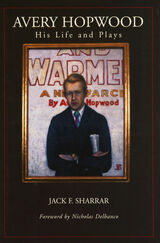

Johann Sebastian Bach holds a singular position in the history of music. A uniquely gifted musician, he combined outstanding performing virtuosity with supreme creative powers and remarkable intellectual discipline. More than two centuries after his lifetime, Bach’s work continues to set musical standards.
The noted Bach scholar Christoph Wolff offers in this book new perspectives on the composer’s life and remarkable career. Uncovering important historical evidence, the author demonstrates significant influences on Bach’s artistic development and brings fresh insight on his work habits, compositional intent, and the musical traditions that shaped Bach’s thought. Wolff reveals a composer devoted to an ambitious and highly individual creative approach, one characterized by constant self-criticism and self-challenge, the absorption of new skills and techniques, and the rethinking of riches from the musical past.
Readers will find illuminating analyses of some of Bach’s greatest music, including the B Minor Mass, important cantatas, keyboard and chamber compositions, the Musical Offering, and the Art of Fugue. Discussion of how these pieces “work” will be helpful to performers—singers, players, conductors—and to everyone interested in exploring the conceptual and contextual aspects of Bach’s music. All readers will find especially interesting those essays in which Wolff elaborates on his celebrated discoveries of previously unknown works: notably the fourteen “Goldberg” canons and a collection of thirty-three chorale preludes.
Representing twenty-five years of scholarship, these essays—half of which appear here in English for the first time—have established Christoph Wolff as one of the world’s preeminent authorities on J. S. Bach. All students, performers, and lovers of Bach’s music will find this an engaging and enlightening book.



Businessman, politician, broadcasting personality, and newspaper publisher, Cas Walker (1902–1998) was, by his own estimation, a “living legend” in Knoxville for much of the twentieth century. Renowned for his gravelly voice and country-boy persona, he rose from blue-collar beginnings to make a fortune as a grocer whose chain of supermarkets extended from East Tennessee into Virginia and Kentucky. To promote his stores, he hosted a local variety show, first on radio and then TV, that advanced the careers of many famed country music artists from a young Dolly Parton to Roy Acuff, Chet Atkins, and Bill Monroe. As a member of the Knoxville city council, he championed the “little man” while ceaselessly irritating the people he called the “silk-stocking crowd.”
This wonderfully entertaining book brings together selections from interviews with a score of Knoxvillians, various newspaper accounts, Walker’s own autobiography, and other sources to present a colorful mosaic of Walker’s life. The stories range from his flamboyant advertising schemes—as when he buried a man alive outside one of his stores—to memories of his inimitable managerial style—as when he infamously canned the Everly Brothers because he didn’t like it when they began performing rock ’n’ roll. Further recollections call to mind Walker’s peculiar brand of bare-knuckle politics, his generosity to people in need, his stance on civil rights, and his lifelong love of coon hunting (and coon dogs). The book also traces his decline, hastened in part by a successful libel suit brought against his muckraking weekly newspaper, the Watchdog.
It’s said that any Knoxvillian born before 1980 has a Cas Walker story. In relating many of those stories in the voices of those who still remember him, this book not only offers an engaging portrait of the man himself and his checkered legacy, but also opens a new window into the history and culture of the city in which he lived and thrived.
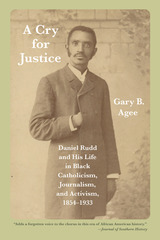
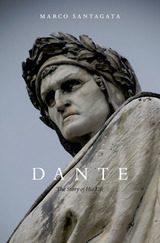
A Times Literary Supplement Book of the Year
A Marginal Revolution Best Non-Fiction Book of the Year
A Seminary Co-op Notable Book of the Year
A Times Higher Education Book of the Week
A Choice Outstanding Academic Title of the Year
Marco Santagata’s Dante: The Story of His Life illuminates one of the world’s supreme poets from many angles—writer, philosopher, father, courtier, political partisan. Santagata brings together a vast body of Italian scholarship on Dante’s medieval world, untangles a complex web of family and political relationships for English readers, and shows how the composition of the Commedia was influenced by local and regional politics.
“Reading Marco Santagata’s fascinating new biography, the reader is soon forced to acknowledge that one of the cornerstones of Western literature [The Divine Comedy], a poem considered sublime and universal, is the product of vicious factionalism and packed with local scandal.”
—Tim Parks, London Review of Books
“This is a wonderful book. Even if you have not read Dante you will be gripped by its account of one of the most extraordinary figures in the history of literature, and one of the most dramatic periods of European history. If you are a Dantean, it will be your invaluable companion forever.”
—A. N. Wilson, The Spectator
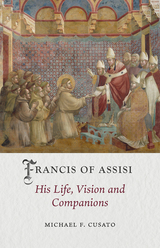
This book is an accessible biography of Francis of Assisi, founder of the Franciscan religious order and one of the most venerated figures in Christianity. In it, Michael F. Cusato explores how Francis and his early brothers embraced a life of poverty in solidarity with the lowest ranks of society, preaching a message of justice and dignity for all. He examines how and why Francis’s vision ultimately expanded to embrace non-Christians and Muslims in particular following Francis’s celebrated encounter with the Sultan al-Malik al-Kamil in 1219. Finally, Cusato considers the clash between Francis and newer members of his Order, his reception of the stigmata, and his final years defending his vision among his own brothers, all while living as an exemplar of the gospel life.

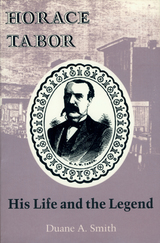
An 1858er who had spent nearly two decades following the will-o-the-wisp Colorado mining frontier, in 1876 Tabor was then living and working in out-of-the-way Oro City, near where Leadville would be one day. Soon thereafter came the Little Pittsburg silver strike, and Tabor's fortune took flight. Very quickly, Colorado - and the rest of the nation - was hearing about Horace Tabor. "Denver's lucky star was on high when Governor Tabor decided to spend his fortune here," praised the Denver Tribune in 1881. The Leadville Daily Herald (July 8, 1882) also understood his contribution: "Colorado has produced fortunes for many men, but no man who has met with success has so freely made investments in this state, as has Governor Tabor."
The events that followed that amazing silver discovery on Fryer Hill, May 1878 unfolded like a classic Greek tragedy. Tabor weathered them all, and his name has resounded through the succeeding decades. No other Coloradan of his generation is so well remembered, nor does anyone else so typify the tempo of this legendary mining era.
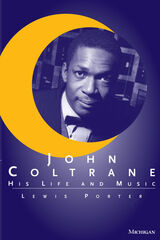
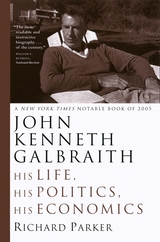
John Kenneth Galbraith (1908-2006) was one of America’s most famous economists for good reason. From his acerbic analysis of America’s “private wealth and public squalor” to his denunciation of the wars in Vietnam and Iraq, Galbraith consistently challenged “conventional wisdom” (a phrase he coined). He did so as a witty commentator on America’s political follies and as a versatile author of bestselling books—such as The Affluent Society and The New Industrial State—that warn of the dangers of deregulated markets, corporate greed, and inattention to the costs of our military power. Here, in the first full-length biography of Galbraith and his times, Richard Parker provides not only a nuanced portrait of this extraordinary man, but also an important reinterpretation of twentieth-century public policy and economic practices.
“Whatever you may think of his ideas, John Kenneth Galbraith has led an extraordinary life. . . . Doing justice to this life story requires an outsize biography, one that not only tells Mr. Galbraith’s tale but sets it on the broader canvas of America’s political and economic evolution. And Richard Parker’s book does just that.”—Economist
“Parker’s book is more than a chronicle of Galbraith’s life; it’s a history of American politics and policy from FDR through George W. Bush. . . . It will make readers more economically and politically aware.”—USA Today
“The most readable and instructive biography of the century.”—William F. Buckley, National Review
“The story of this man’s life and work is wonderfully rendered in this magnum opus, and offers an antidote to the public ennui, economic cruelty, and government malfeasance that poison life in America today.”—James Carroll, Boston Globe
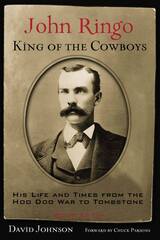
The Mason County “Hoo Doo” War in Texas began as a war over range rights, but it swiftly deteriorated into blood vengeance and spiraled out of control as the body count rose. In this charnel house Ringo gained a reputation as a dangerous gunfighter and man killer. He was proclaimed throughout the state as a daring leader, a desperate man, and a champion of the feud. Following incarceration for his role in the feud, Ringo was elected as a lawman in Mason County, the epicenter of the feud’s origin.
The reputation he earned in Texas, further inflated by his willingness to shoot it out with Victorio’s raiders during a deadly confrontation in New Mexico, preceded him to Tombstone in territorial Arizona. Ringo became immersed in the area’s partisan politics and factionalized violence. A champion of the largely Democratic ranchers, Ringo would become known as a leader of one of these elements, the Cowboys. He ran at bloody, tragic odds with the Earp brothers and Doc Holliday, finally being part of the posse that hounded these fugitives from Arizona. In the end, Ringo died mysteriously in the Arizona desert, his death welcomed by some, mourned by others, wrongly claimed by a few. Initially published in 1996, John Ringo has been updated to a second edition with much new information researched and uncovered by David Johnson and other Ringo researchers.
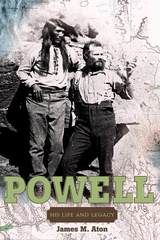
“John Wesley Powell: explorer, writer, geologist, anthropologist, land planner, bureaucrat. Which one do we focus on?” This is the question author James M. Aton poses at the beginning of his biography of Powell, though he soon decides that it is impossible to ignore any facet of Powell’s life. Powell was a polymath, one whose “divergent interests resemble one of those braided streambeds in his beloved canyon country, branching out in many directions, but ultimately beginning and ending in the same stream."
Aton beautifully tells the multidimensional stories of Powell’s childhood, his military and teaching careers, his famous and exciting explorations of the Colorado River, and the battles he waged from his influential positions within the Smithsonian’s Bureau of Ethnology and the United States Geological Survey. This new edition of John Wesley Powell: His Life and Legacy, first printed as an issue of the Boise State University Western Writers Series, includes the original biography, but also features Aton’s new interpretations of Powell’s writings on exploration, land-planning, anthropology, and irrigation, and incorporates the author’s distinguished faculty lecture on Powell and cash-register dams in the Colorado River Basin.

“In Lennie Tristano: His Life in Music, Shim has provided a comprehensive biographical and analytical account of one of jazz’s most important and most frequently misunderstood figures. Her insights into Tristano’s personality are well nuanced, and the focus on his teaching makes a unique contribution to the history of jazz. This vividly written study is likely to become a standard work.”
—Brian Priestley, author of Chasin’ the Bird: The Life and Legacy of Charlie Parker and coauthor of The Rough Guide to Jazz
“Eunmi Shim’s book is clearly a labor of love. Her thorough examination of Tristano’s teaching is particularly important, for no one previously has assembled the thoughts of so many former students. Her illuminating transcriptions of, and commentaries on, Tristano’s solos are also valuable. Lennie Tristano is an important contribution to the literature on jazz.”
—Thomas Owens, author of Bebop: The Music and Its Players
“Comprehensive, objective, and acute in its judgments, this is the biography of Lennie Tristano we have been waiting for.”
—Larry Kart, author of Jazz in Search of Itself
Lennie Tristano occupies a rare position not only in jazz history but in the history of twentieth-century music. Emerging from an era when modernism was the guiding principle in art, Tristano explored musical avenues that were avant-garde even by modernism’s experimental standards. In so doing, he tested and transcended the boundaries of jazz.
In 1949, years before musicians such as Ornette Coleman and Cecil Taylor took credit for the movement, Tristano made the first recordings of “free jazz,” a new kind of group improvisation based on spontaneous interaction among band members without any regard for predetermined form, harmony, or rhythm. Then, in the 1950s, Tristano broke new ground by his use of multitracking.
Tristano was also a pioneer in the teaching of jazz, devoting the latter part of his career almost exclusively to music instruction. He founded a jazz school—the first of its kind—among whose students were saxophonists Warne Marsh and Lee Konitz, and pianist Sal Mosca.
With its blend of oral history, archival research, and musical analysis, Lennie Tristano sheds new light on the important role Tristano played in the jazz world and introduces this often-overlooked musician to a new generation of jazz aficionados.
Eunmi Shim received her Ph.D. in musicology from the University of Illinois at Urbana-Champaign and is now Assistant Professor of Music at Worcester Polytechnic Institute. This is her first book.

John Churchill, the Duke of Marlborough (1644-1722), was one of the greatest military commanders and statesmen in the history of England. Victorious in the Battles of Blenheim (1704), Ramillies (1706), and countless other campaigns, Marlborough, whose political intrigues were almost as legendary as his military skill, never fought a battle he didn't win. Although he helped James II crush the rebellion of the Duke of Monmouth, Marlborough later supported William of Orange against James II in the Glorious Revolution of 1688 and brilliantly managed England's diplomatic triumphs during the War of the Spanish Succession. Marlborough also bequeathed the world another great British military strategist and diplomat—his descendant, Winston S. Churchill, who wrote this book to redeem Marlborough's reputation from Macaulay's smears.
One million words long and ten years in the making, Churchill's Marlborough stands as both a literary and historical masterpiece, giving us unique insights into the Churchill of World War II, for just as Churchill's literary skill helps us understand the complexities of Marlborough's life, so too did his writing of Marlborough help Churchill master the arts of military strategy and diplomacy. This two-volume edition includes the entire text and almost all the original maps.

John Churchill, the Duke of Marlborough (1644-1722), was one of the greatest military commanders and statesmen in the history of England. Victorious in the Battles of Blenheim (1704), Ramillies (1706), and countless other campaigns, Marlborough, whose political intrigues were almost as legendary as his military skill, never fought a battle he didn't win. Although he helped James II crush the rebellion of the Duke of Monmouth, Marlborough later supported William of Orange against James II in the Glorious Revolution of 1688 and brilliantly managed England's diplomatic triumphs during the War of the Spanish Succession. Marlborough also bequeathed the world another great British military strategist and diplomat—his descendant, Winston S. Churchill, who wrote this book to redeem Marlborough's reputation from Macaulay's smears.
One million words long and ten years in the making, Churchill's Marlborough stands as both a literary and historical masterpiece, giving us unique insights into the Churchill of World War II, for just as Churchill's literary skill helps us understand the complexities of Marlborough's life, so too did his writing of Marlborough help Churchill master the arts of military strategy and diplomacy. This two-volume edition includes the entire text and almost all the original maps.
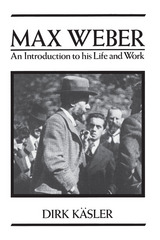
Käsler offers a comprehensive account of Weber's views, giving attention both to the context in which Weber produced his most significant contributions to social science, and to the changes involved in his work over the course of his career. This volume also serves as an introduction to the controversies that Weber's writings have stimulated, from the time of their first appearance to the present day.
This book will be of vital interest to anyone concerned with Max Weber and will undoubtedly become the leading student text on Weber in the English-speaking world.

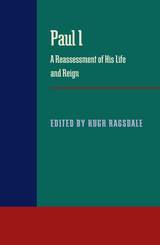
This book offers the first book-length English language biography of Russian emperor Paul I (1754–1801), since a 1913 translation. Most of the essays have been written expressly for this volume. They examine Paul’s education, his mental pathology, his administrative aims, curious relations with the knights of Malta and with Bonaparte, and his struggles with the threatening ideas emanating from the French Revolution. There is also a provocative new view of the conspiracy that took Paul’s life.
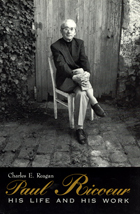
"A valuable introduction to Ricoeur; highly recommended."—Library Journal
"[A] lively introduction to the life and thought of one of this century's most notable philosophers."—Norman Wirzba, Christian Century
"Reagan lucidly explains Ricoeur's difficult philosophy while shining overdue light on the personality behind it."—Carlin Romano, Philadelphia Inquirer
"Combines biographical and philosophical essays with a more personal memoir that makes Ricoeur's humane and magnanimous nature abundantly evident. Four revealing interviews, coupled with photographs, and an extensive bibliography of primary and secondary sources, complete this illuminating study."—Choice
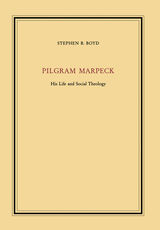
Drawing on extensive archival data documenting Marpeck’s professional life, as well as on his numerous published and unpublished writings on theology and religious reform, Stephen B. Boyd traces Marpeck’s unconventional transition from mining magistrate to Anabaptist leader, establishes his connections with various radical social and religious groups, and articulates aspects of his social theology. Marpeck’s distinctive and eclectic theology, Boyd demonstrates, focused on the need for personal, uncoerced conversion, rejected state interference in the affairs of the church, denied the need for a monastic withdrawal from the secular world, and called for the Christian’s active pursuit of justice before God and among human beings.
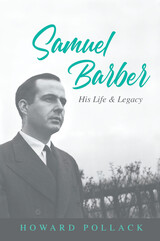
Acclaimed biographer Howard Pollack (Aaron Copland, George Gershwin) offers a multifaceted account of Barber’s life and music while placing the artist in his social and cultural milieu. Born into a musical family, Barber pursued his artistic ambitions from childhood. Pollack follows Barber’s path from his precocious youth through a career where, from the start, the composer consistently received prizes, fellowships, and other recognition. Stylistic analyses of works like the Adagio for Strings, the Violin Concerto, Knoxville: Summer of 1915 for voice and orchestra, the Piano Concerto, and the operas Vanessa and Antony and Cleopatra, stand alongside revealing accounts of the music’s commissioning, performance, reception, and legacy. Throughout, Pollack weaves in accounts of Barber’s encounters with colleagues like Aaron Copland and Francis Poulenc, performers from Eleanor Steber and Leontyne Price to Vladimir Horowitz and Van Cliburn, patrons, admirers, and a wide circle of eminent friends and acquaintances. He also provides an eloquent portrait of the composer’s decades-long relationship with the renowned opera composer Gian Carlo Menotti.
Informed by new interviews and immense archival research, Samuel Barber is a long-awaited critical and personal biography of a monumental figure in twentieth-century American music.
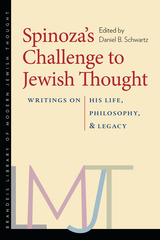


Smith begins by exploring Jung's formative and transformative life experience, including his relationships with a deeply troubled mother and despairing father, with Sigmund Freud, and with the various women in his life. The relationships to his parents, in particular, have been remarkably unexplored by scholars. Smith then shows how these experiences shaped Jung's thoughts and writing -including his reassessment of religion as inner process - as well as his fascination with gnosticism and alchemy; the attention Jung gives to psychology as myth and the realization of selfhood; and his reinterpretation of evil as a process to be integrated into the proper sphere of human existence.
Smith's findings are based on the unprecedented number of primary sources to which he had access, including archival research, his own interviews with many of Jung's intimates, and personal correspondence with Jung himself, as well as on the synthesis of a wide range of recent scholarship on Jung. The culmination of many years of scholarship and reflection, this book should be read by anyone interested in spiritual healing or the connection between psychology and religion.
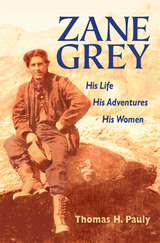
Zane Grey was a disappointed aspirant to major league baseball and an unhappy dentist when he belatedly decided to take up writing at the age of thirty. He went on to become the most successful American author of the 1920s, a significant figure in the early development of the film industry, and a central player in the early popularity of the Western.
Thomas H. Pauly's work is the first full-length biography of Grey to appear in over thirty years. Using a hitherto unknown trove of letters and journals, including never-before-seen photographs of his adventures--both natural and amorous--Zane Grey has greatly enlarged and radically altered the current understanding of the superstar author, whose fifty-seven novels and one hundred and thirty movies heavily influenced the world's perception of the Old West.
READERS
Browse our collection.
PUBLISHERS
See BiblioVault's publisher services.
STUDENT SERVICES
Files for college accessibility offices.
UChicago Accessibility Resources
home | accessibility | search | about | contact us
BiblioVault ® 2001 - 2024
The University of Chicago Press


